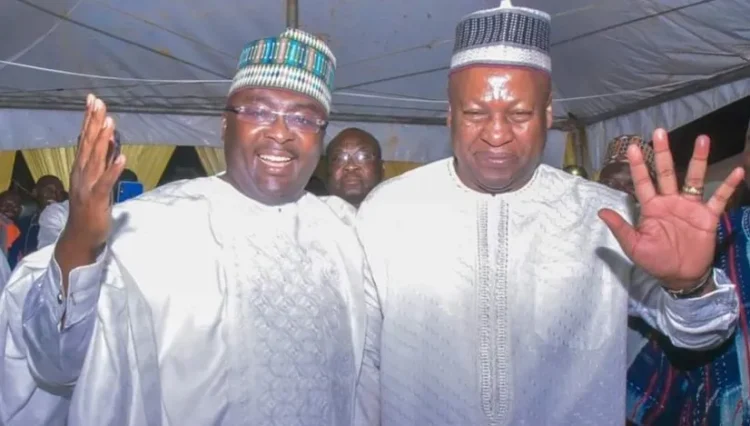Ghana is set to conduct its presidential and parliamentary elections on December 7, 2024. The race for the presidency has attracted significant attention, with leading contenders Dr. Mahamudu Bawumia of the New Patriotic Party (NPP) and John Dramani Mahama of the National Democratic Congress (NDC) locking horns in what is expected to be a closely fought contest.
Both candidates hail from the Northern Region and bring contrasting visions to the campaign.
Dr. Bawumia has focused on digitalization and economic transformation, while Mr. Mahama has drawn on his governance experience and promises of inclusive development.
Their campaigns culminated in large rallies where they appealed to voters to back their respective visions for Ghana’s future.
In addition to the two main contenders, 11 other candidates from various political parties and an independent candidate are also vying for the presidency.
These include Alan Kyerematen (Independent Candidate for the Movement for Change), Christian Kwabena Andrews (Ghana Union Movement), Kofi Akpaloo (Liberal Party of Ghana), Hassan Ayariga (All People’s Congress), and Nana Akosua Frimpomaa Sarpong Kumankuma (Convention People’s Party – CPP).
Other presidential hopefuls are Mohammed Frimpong (National Democratic Party – NDP), Daniel Augustus Lartey Jnr (Great Consolidated Popular Party – GCPP), and independent candidates Kofi Koranteng, George Twum-Barimah-Adu, and Nana Kwame Bediako.
The election also comes with an unusual circumstance following the demise of Akua Donkor, the presidential candidate for the Ghana Freedom Party (GFP), in October 2024. Despite her passing, her image and party logo remain on the ballot paper.
However, the Electoral Commission (EC) has announced that votes cast in her name will be considered invalid and categorized as rejected ballots.
In addition to choosing a president, Ghanaians will also elect 275 members of parliament to represent them in the legislature. As the West African nation prepares for this crucial electoral exercise, all eyes are on the outcomes, which could shape the country’s political and economic trajectory for years to come.
Voter Register
The voter register for the 2024 Ghana elections reveals significant insights into the electorate’s composition.
According to the Electoral Commission of Ghana, 18,807,854 voters have been confirmed eligible, with biometric registration ensuring secure polling station assignments. This reflects a 10.03% growth in voter population, rising from 17,061,369 in 2020. Of these, 18,640,811 voters are biometrically registered, ensuring verification on election day.
Key Political Insights:
- NPP Strongholds:
Voter population in NPP-dominated regions (Ahafo, Ashanti, Bono, Eastern, Western) rose from 6,858,388 in 2020 to 7,473,766 in 2024, growing by 8.97%. However, the NPP’s share of the national register declined slightly from 40.2% in 2020 to 39.8% in 2024, indicating a potential loss of 75,093 voters. - NDC Strongholds:
In NDC-dominated regions (Northern, Oti, North East, Bono East, Upper East, Western North, Savannah), voter numbers increased from 5,105,460 in 2020 to 5,782,069 in 2024, with a growth rate of 13.25%. This boosted the NDC’s share of the register from 29.9% in 2020 to 30.8% in 2024, representing 168,960 additional voters.
Regional Trends:
- Ashanti Region (NPP’s Base):
Voter population grew by 9.11%, reaching 3,295,274 in 2024, but its share of the national register dropped slightly from 17.702% to 17.553%. - Volta Region (NDC’s Base):
Voter numbers rose by 9.11%, totaling 1,023,830 in 2024, with its national share increasing from 5.416% to 5.454%. - Greater Accra Region (Swing Region):
With 3,765,303 voters in 2024 (up 6.7% from 2020), its share decreased marginally from 20.67% to 20.057%. - Central Region (Swing Region):
Voter population climbed 11.72% to 1,752,165 in 2024, raising its share from 9.192% to 9.333%.
Regional Rankings
- Greater Accra – 3,765,303 voters
- Ashanti – 3,295,274 voters
- Eastern – 1,810,421 voters
- Central – 1,787,305 voters
- Western – 1,288,777 voters
- Western North – 522,506 voters
- Northern – 1,209,934 voters
- Volta – 1,023,830 voters
- Ahafo – 359,284 voters
- Bono – 719,916 voters
- Oti – 672,830 voters
- Bono East – 410,607 voters
- Savannah – 342,431 voters
- North East – 339,883 voters
- Upper East – 741,288 voters
- Upper West – 518,365 voters
Total Registered Voters – 18,807,854
